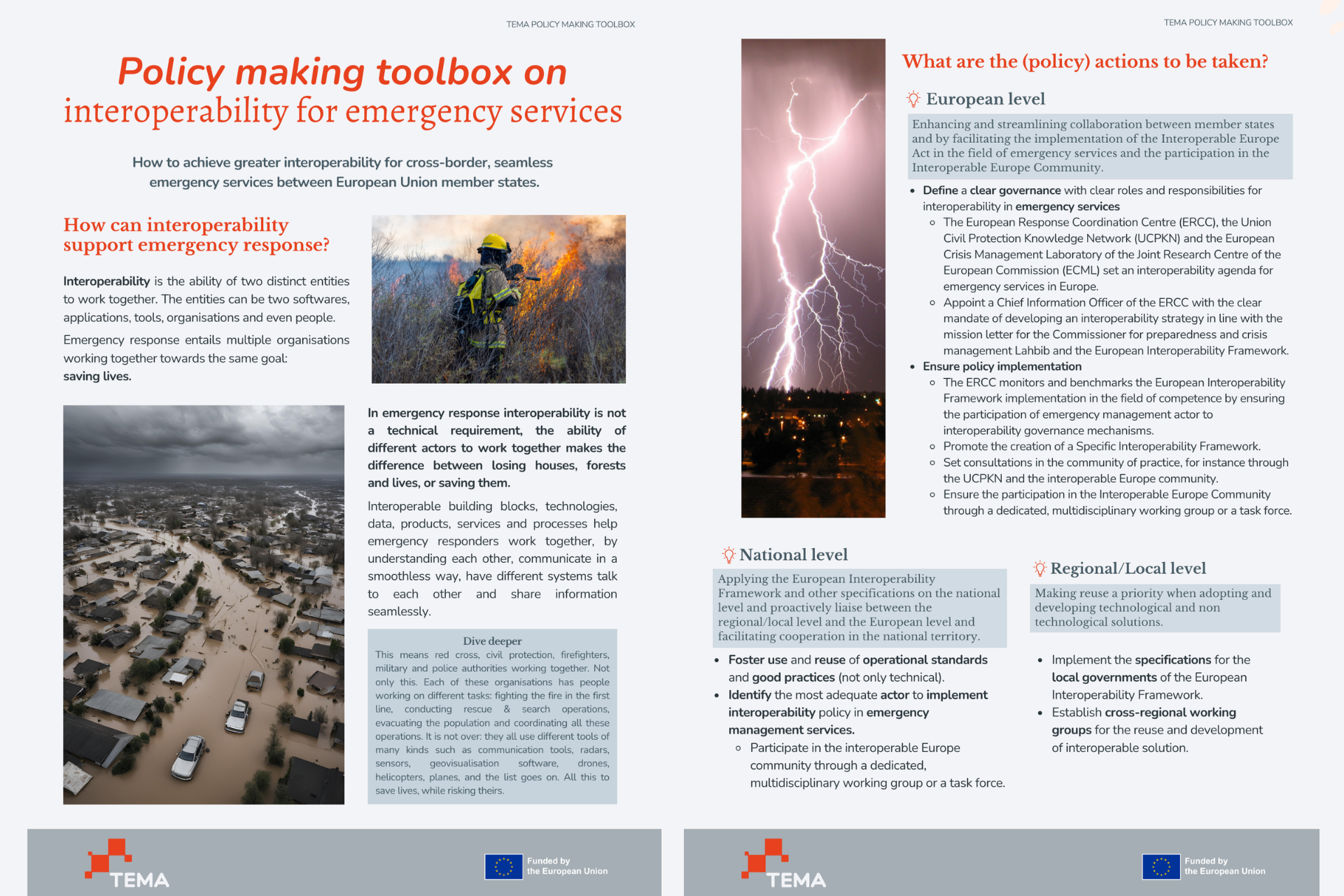Expert working session recap: Crisis without Borders

21 February 2025
Alessandro Paciaroni, Public Sector Innovation Expert at the Lisbon Council
Aikaterini Beli, Communication Manager at the Lisbon Council
On Friday 14 February 2025, TEMA communication and dissemination lead partners, the Lisbon Council, convened the online expert working session titled “Crisis Without Borders: How Can Interoperability in Emergency Management Services Better Prepare Us to Meet Disaster Resilience Goals?"
Participants heard from high-level speakers including keynote speeches by Isa von Kalben, programme manager for the directorate general for digital services, and Teresa Capula, policy officer for the directorate general for European civil protection and humanitarian aid operations. A special presentation by Marzia Santini, team leader of the Joint Research Center’s European Crisis Management Laboratory, and Luigi Spagnolo, IT assistant of the Joint Research Center’s European Crisis Management Laboratory, followed, while distinguished experts Uwe Kippnich, coordinator of security research at the Bavarian Red Cross, and Giorgia Lodi, technologist at the Institute of Cognitive Sciences and Technologies of the Italian Consiglio Nazionale della Ricerca, presented their insights.
Summary
Today’s crises are increasingly complex and cross national boundaries, making interoperability in emergency management a cornerstone of disaster resilience. As highlighted in the Joint Research Centre’s cross-border risk report and the Union Civil Protection Knowledge Network Strategic Plan 2022-2026, Europe’s ability to respond effectively depends on emergency services that are seamlessly connected across regions.
The Interoperable Europe Act provides a structured governance model to address these challenges. It establishes legal, organisational and semantic interoperability frameworks to facilitate cross-border cooperation. At its core, the European Interoperability Framework guides digital and crisis management governance, while the Interoperable Europe Board oversees interoperability assessments and specialised frameworks. Regulatory sandboxes allow for pilot testing of solutions before crises emerge, ensuring systems and protocols are fully functional under real-world conditions. The Interoperable Europe Academy provides training and resources to further support policymakers and practitioners.
The Union Civil Protection Mechanism and its Union Civil Protection Knowledge Network play a central role in enhancing cooperation and capacity development among European Union member states and participating states. Through a training program, expert exchanges, and joint exercises, the Mechanism strengthens preparedness and response capabilities. This framework aligns with the European Commission’s broader push for a 'Preparedness Union', a key priority outlined in the mission letter to Commissioner Hadja Lahbib, which calls for whole-of-government and whole-of-society approaches.
The European Crisis Management Laboratory, part of the Joint Research Centre, was presented as a key initiative supporting emergency management through data-driven decision-making, real-time crisis simulations and interoperability testing. The laboratory develops technical solutions that allow emergency response teams to integrate multiple data sources, improve risk assessment and enhance situational awareness. Alongside platforms such as the European Crisis Management Platform and the Adena platform for public health threats, these initiatives are critical for strengthening Europe’s resilience and crisis coordination mechanisms.
Lessons from Real-World Emergencies
Italy’s COVID-19 response illustrated the dangers of fragmented health data systems and inconsistent data interpretations. The country’s decentralised healthcare system created challenges in data exchange between national and regional authorities, delaying crisis response. Efforts to implement standardised data semantics and develop common application programming interfaces (APIs) encountered technical, administrative and governance barriers, largely due to insufficient stakeholder coordination and a lack of pre-established interoperability frameworks. This case reinforced the need for interoperability as a foundational requirement for emergency preparedness, not a reactive measure during crises.
The July 2021 flash floods in Western Europe demonstrated how interoperability played a decisive role in crisis response. The discussion highlighted the importance of real-time, multi-level information-sharing between emergency services, national agencies and international partners. Despite existing coordination mechanisms, gaps in data access, inconsistent formats and procedural misalignments slowed response efforts in the critical early hours of the disaster. The case study reinforced the necessity of practical, field-ready interoperability solutions, ensuring that emergency responders have immediate access to accurate, actionable information when every second counts.
A core takeaway from the session was the importance of ensuring interoperability “by design” rather than reactively during crises. Participants emphasised the need for a continuous feedback loop between policymakers, researchers and frontline emergency responders, ensuring that interoperability frameworks are both practical and actionable in real-world disaster scenarios.
The session’s findings support the European Union’s strategic objective of building a more resilient, prepared and technologically coordinated crisis management ecosystem. By aligning with key policies such as the Interoperable Europe Act, the Union Civil Protection Mechanism and the Preparedness Union strategy, interoperability can serve as the backbone of Europe’s crisis response system.
The TEMA policy toolbox
Within the context of the expert working session, TEMA launched the final version of a policy making toolbox to improve interoperability in emergency management services. This toolbox consists of the policy recommendations to foster a cross-border emergency management services ecosystem, answering questions such as:
- How can various actors enhance the community of practice across borders?
- What are unique elements of emergency management services to consider for cross-border collaboration?
- How can we foster the cooperation between digital services providers and emergency management practitioners across borders?
Take a look at the TEMA policy making toolbox below.


